Resume
Physician Cover Letter Examples

May 29, 2025
|
12 min read
Demystifying the art of crafting doctor cover letters: make your application a surefire "cure" to your job search woes, and learn how your skills and passion can truly make you the "write" choice for any medical team.
4.70 Average rating
Rated by 348 people
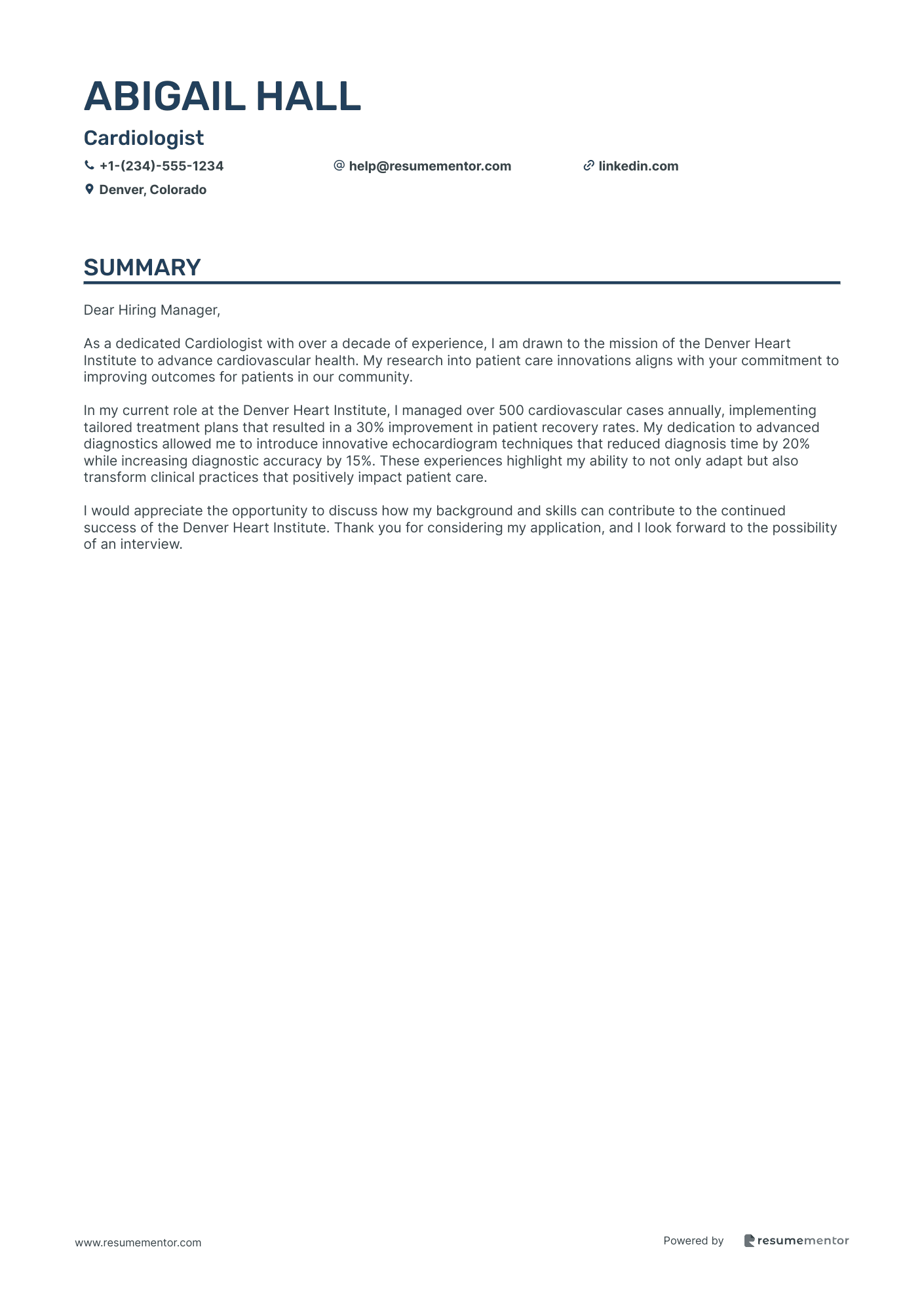
Cardiologist
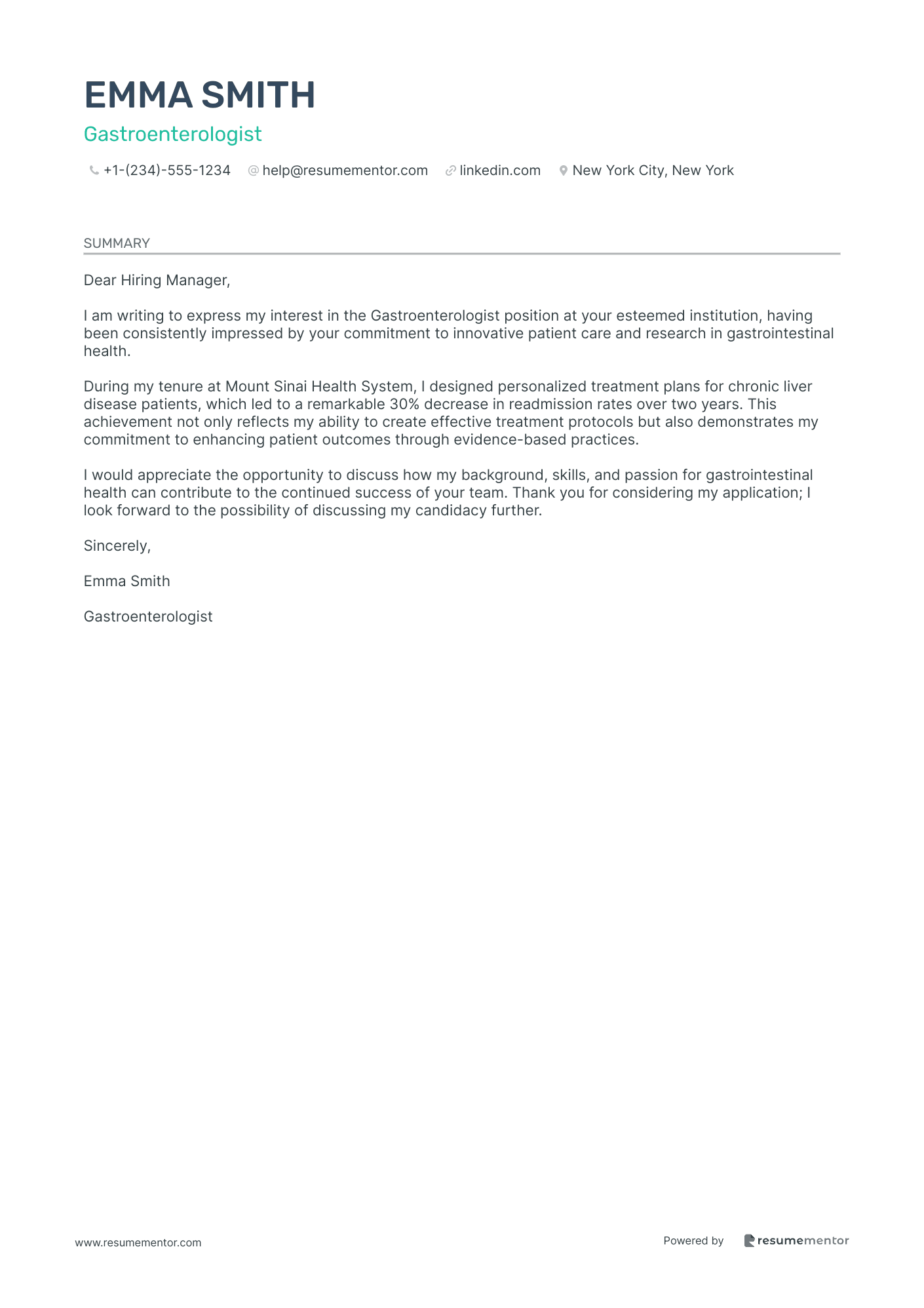
Gastroenterologist
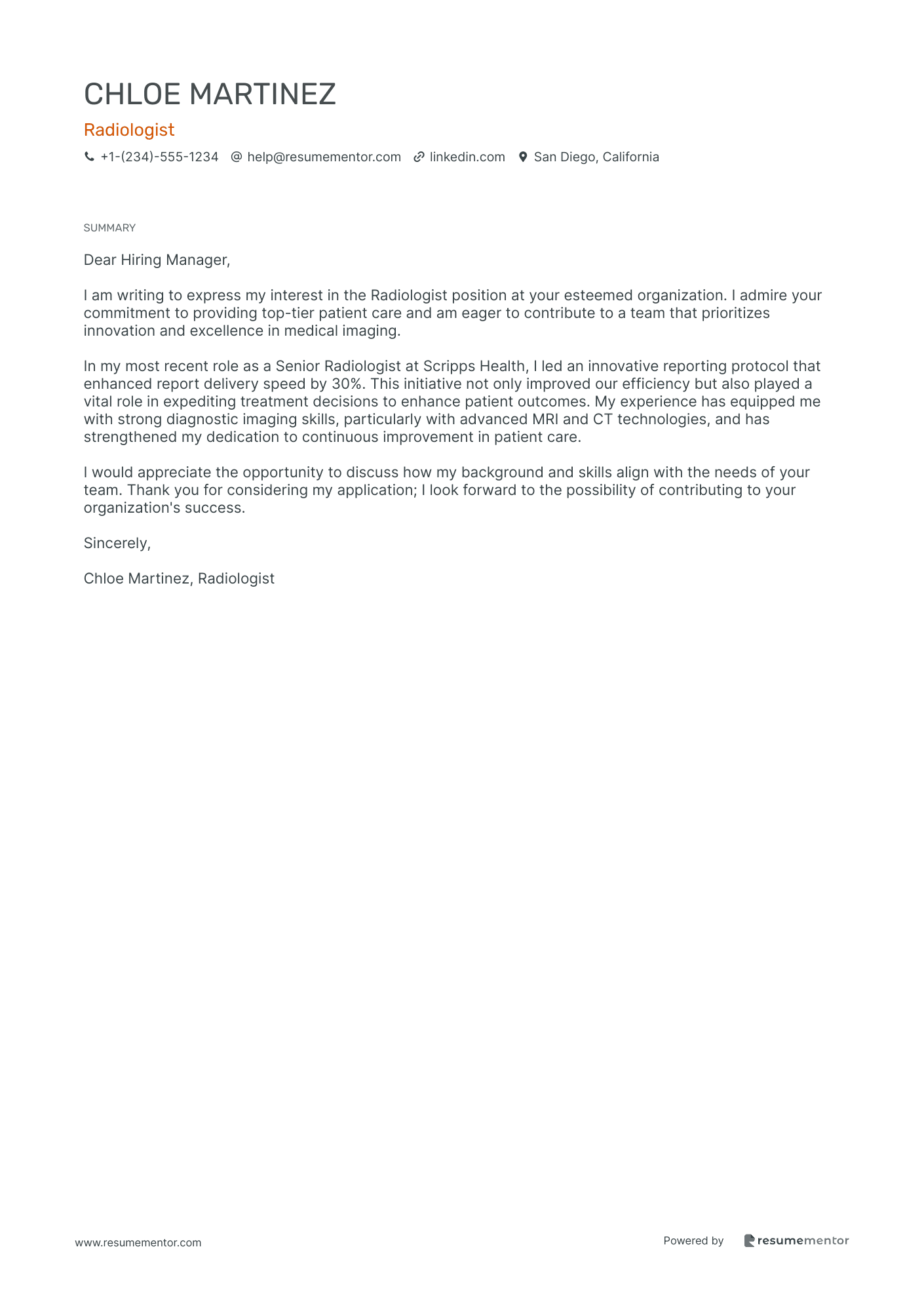
Radiologist
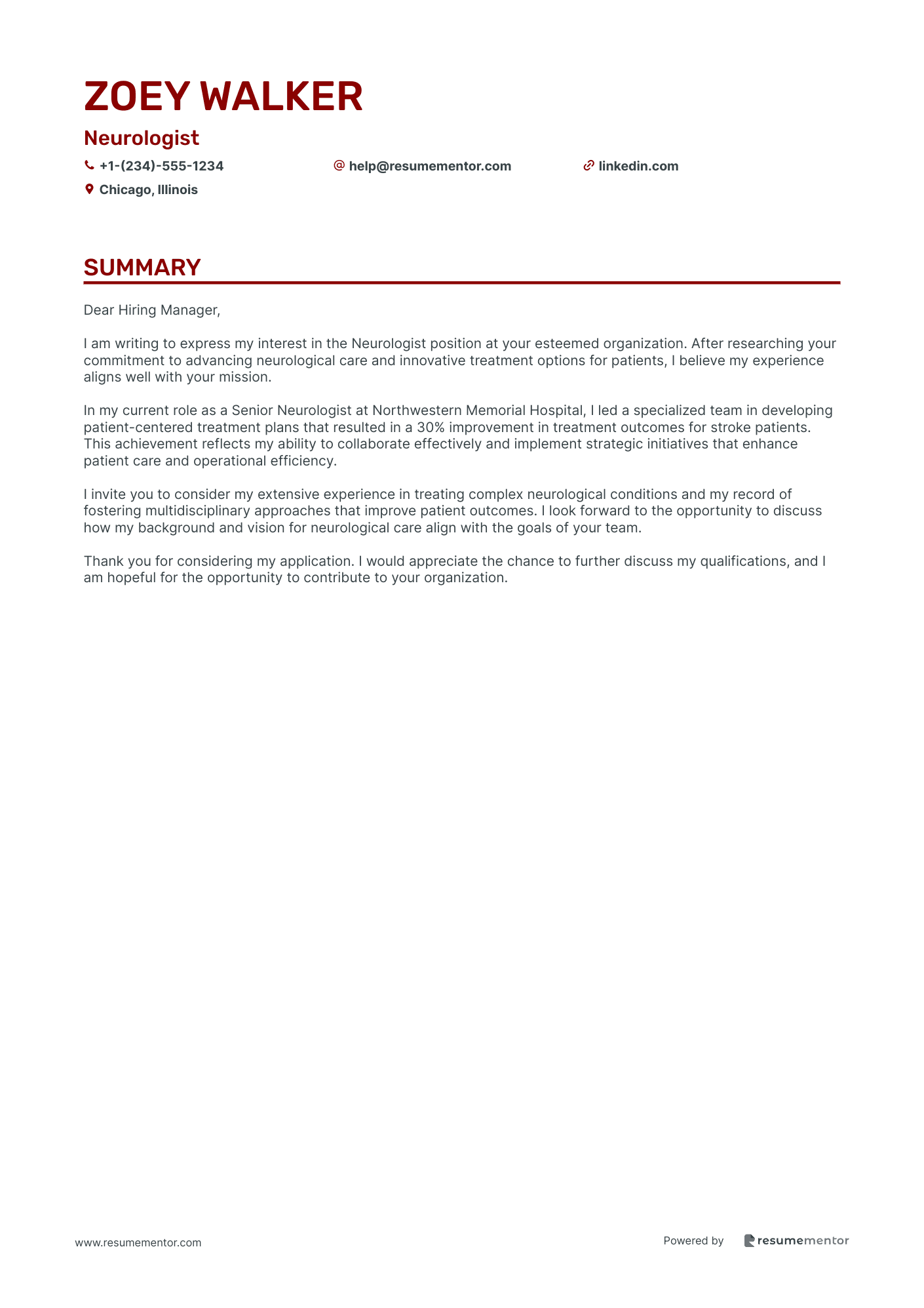
Neurologist
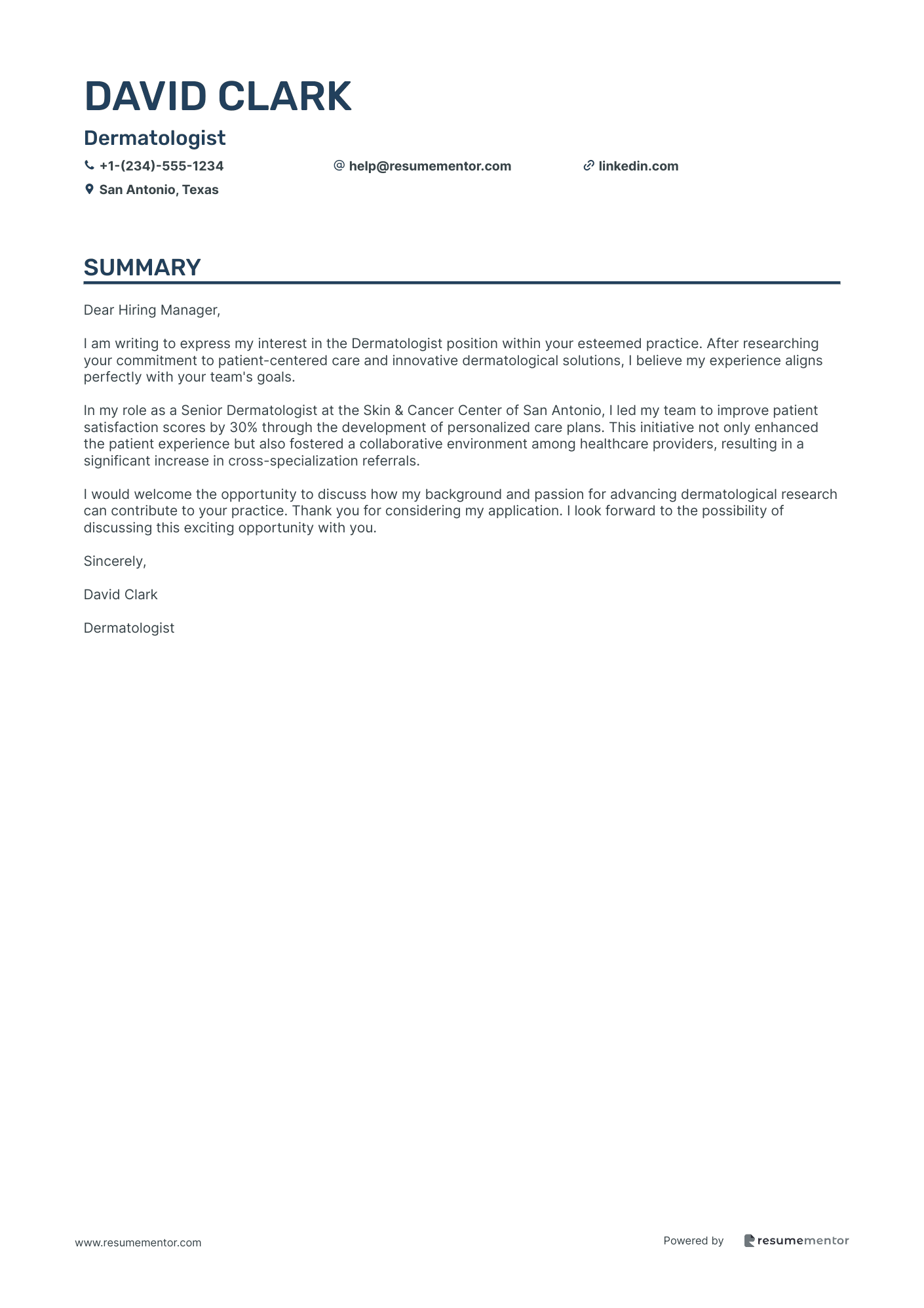
Dermatologist
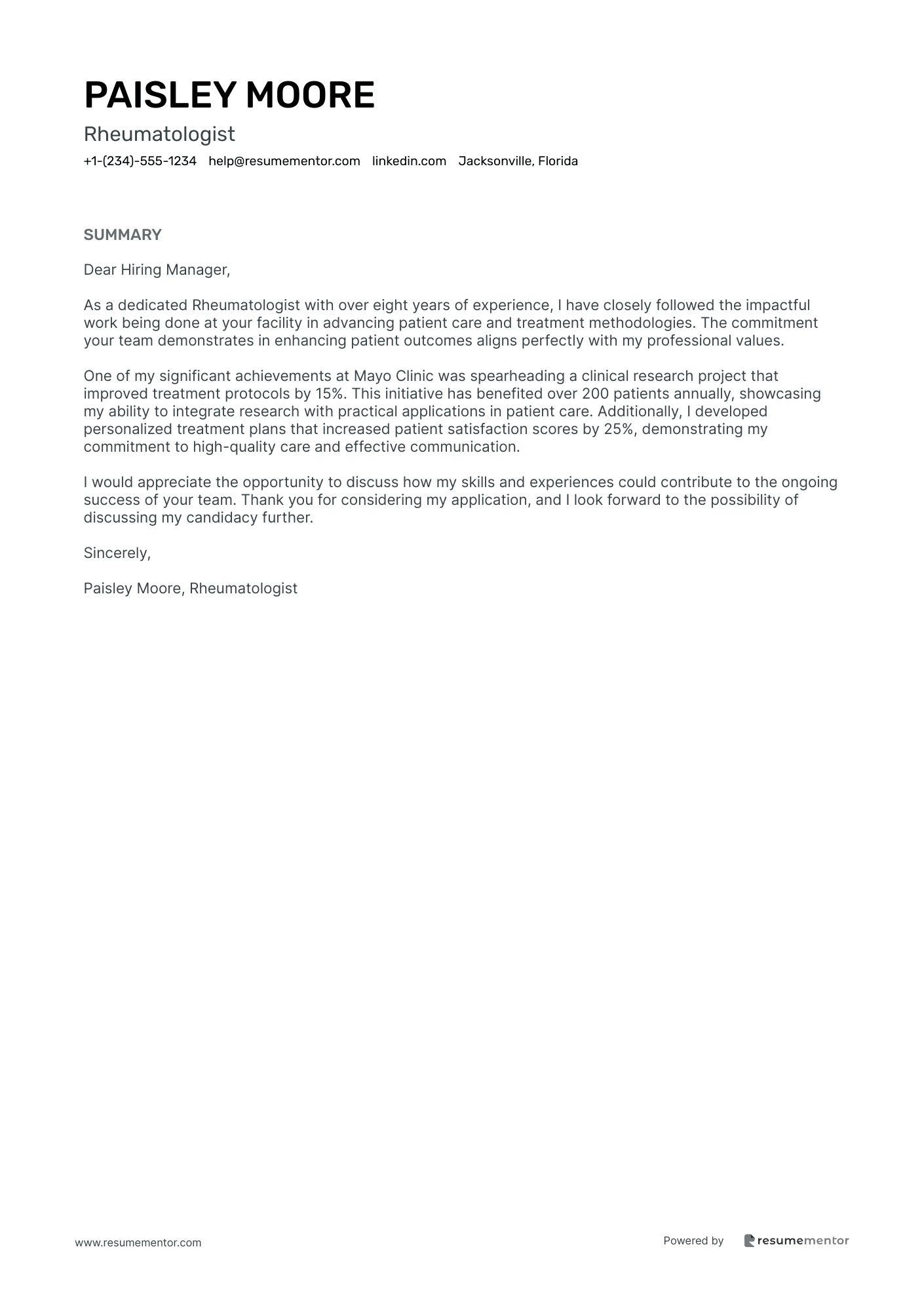
Rheumatologist
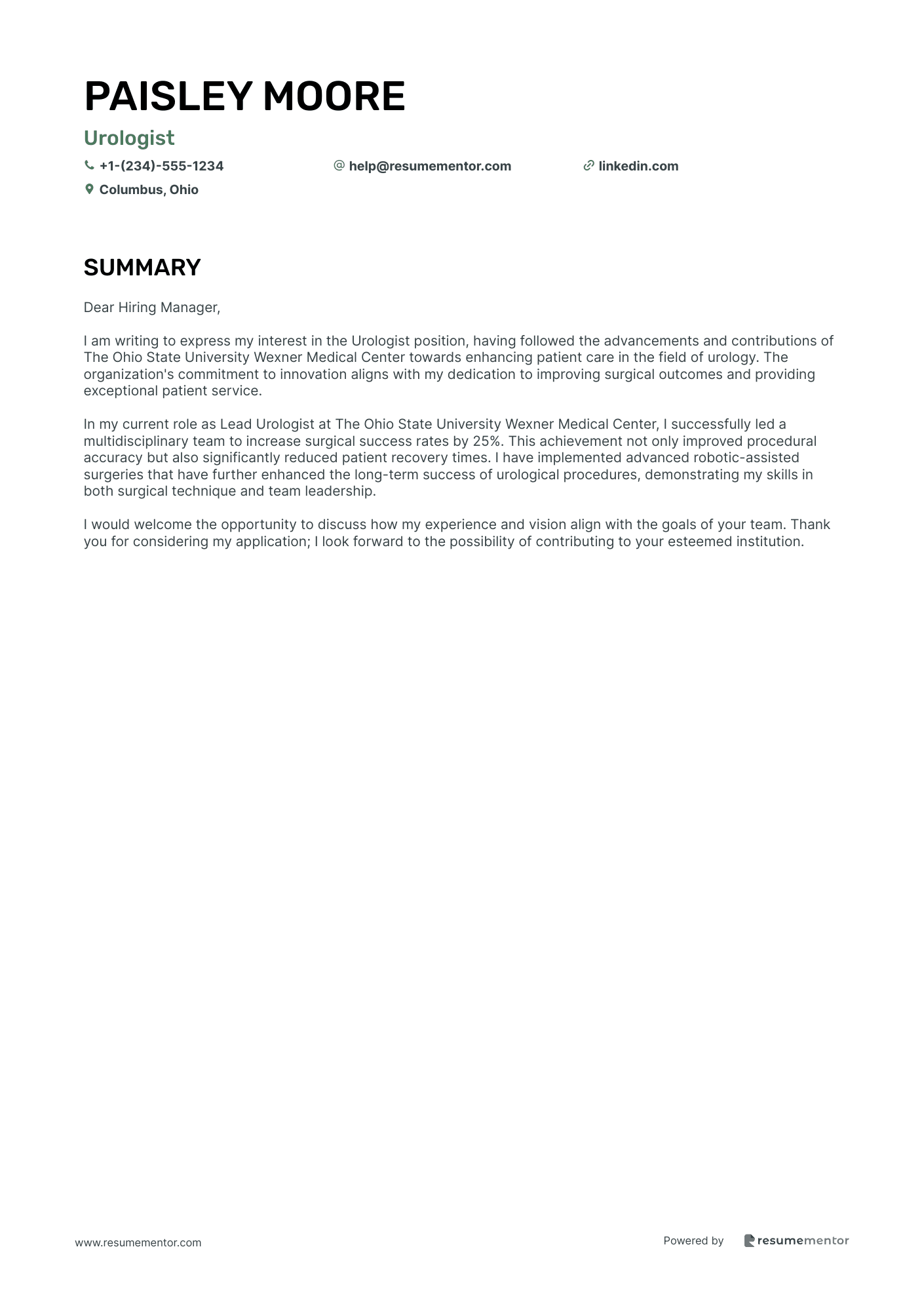
Urologist
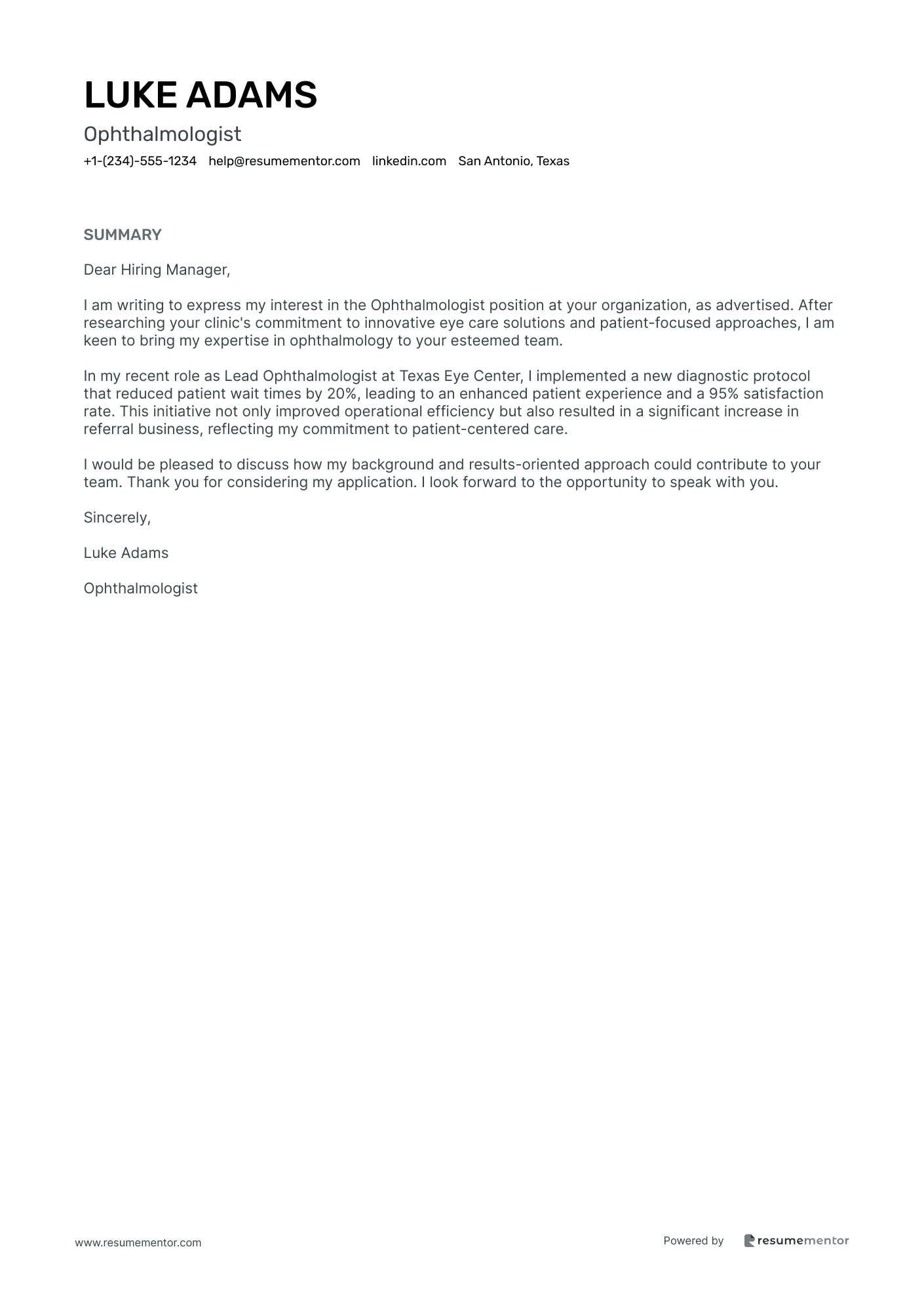
Ophthalmologist
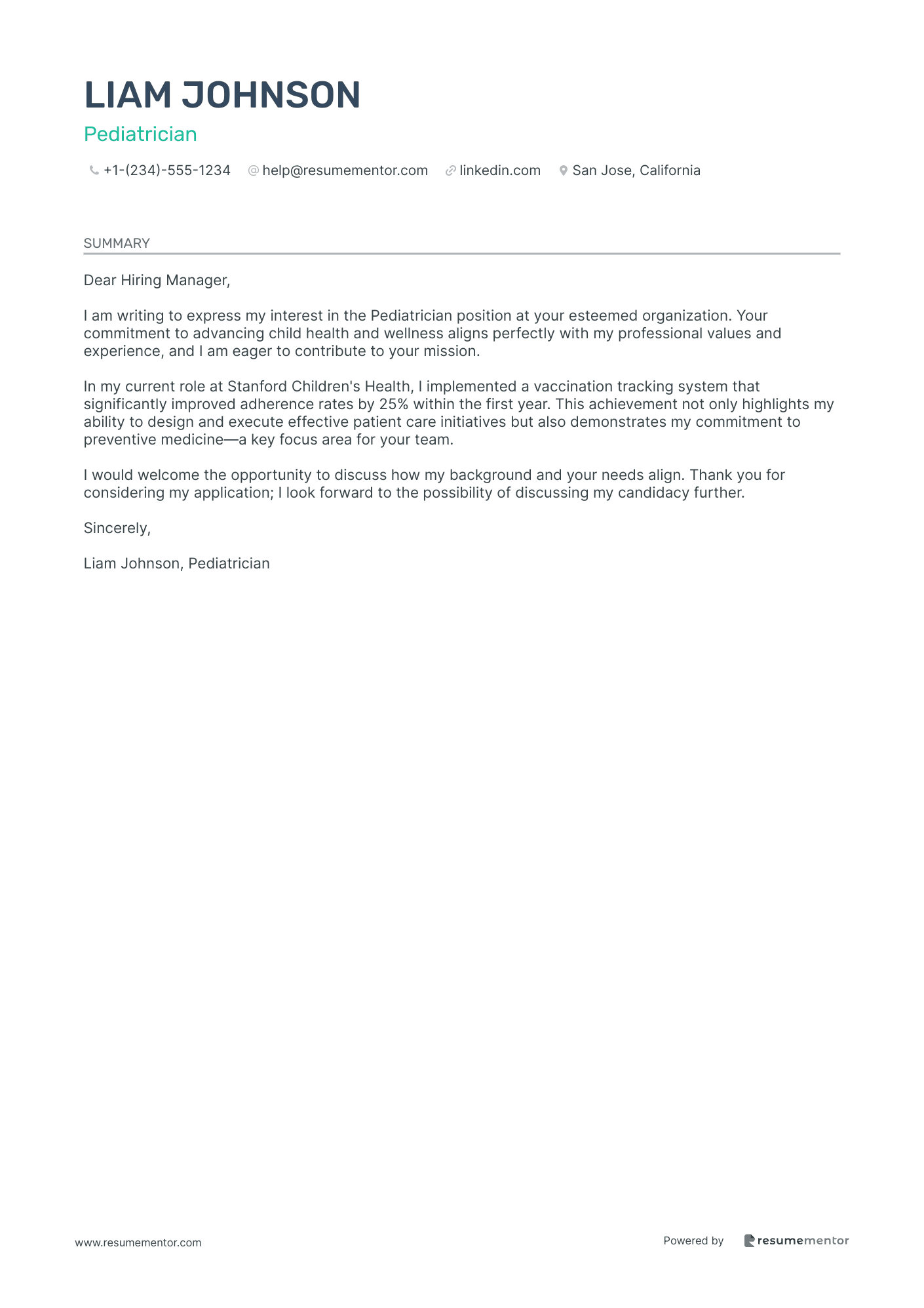
Pediatrician

Cardiologist cover letter sample
When crafting your cover letter, prioritize highlighting your extensive clinical experience and any specialized training in cardiac care. Emphasize your proficiency in performing diagnostic procedures, such as echocardiograms or stress tests. Mention any board certifications you hold, as these reinforce your expertise. Use specific examples of how your intervention has improved patient outcomes, following a clear 'skill-action-result' structure. Additionally, discuss your ability to collaborate with multidisciplinary teams to provide comprehensive care, as teamwork is crucial in this field.
Summary
Dear Hiring Manager,
As a dedicated Cardiologist with over a decade of experience, I am drawn to the mission of the Denver Heart Institute to advance cardiovascular health. My research into patient care innovations aligns with your commitment to improving outcomes for patients in our community.
In my current role at the Denver Heart Institute, I managed over 500 cardiovascular cases annually, implementing tailored treatment plans that resulted in a 30% improvement in patient recovery rates. My dedication to advanced diagnostics allowed me to introduce innovative echocardiogram techniques that reduced diagnosis time by 20% while increasing diagnostic accuracy by 15%. These experiences highlight my ability to not only adapt but also transform clinical practices that positively impact patient care.
I would appreciate the opportunity to discuss how my background and skills can contribute to the continued success of the Denver Heart Institute. Thank you for considering my application, and I look forward to the possibility of an interview.
Gastroenterologist cover letter sample
When applying for this position, emphasize your clinical experience in diagnosing and treating gastrointestinal disorders. Highlight any specialized training, such as endoscopic techniques or dietary management. If you've published research or presented at conferences, mention these achievements to showcase your commitment to the field. Strong patient management skills are essential, so provide examples of successful patient outcomes or improved treatment plans you've contributed to. Use specific metrics to demonstrate how your expertise has impacted patient care and contributed to the institution's goals.
Emma Smith
Gastroenterologist
Summary
Dear Hiring Manager,
I am writing to express my interest in the Gastroenterologist position at your esteemed institution, having been consistently impressed by your commitment to innovative patient care and research in gastrointestinal health.
During my tenure at Mount Sinai Health System, I designed personalized treatment plans for chronic liver disease patients, which led to a remarkable 30% decrease in readmission rates over two years. This achievement not only reflects my ability to create effective treatment protocols but also demonstrates my commitment to enhancing patient outcomes through evidence-based practices.
I would appreciate the opportunity to discuss how my background, skills, and passion for gastrointestinal health can contribute to the continued success of your team. Thank you for considering my application; I look forward to the possibility of discussing my candidacy further.
Sincerely,
Emma Smith
Gastroenterologist
Radiologist cover letter sample
When applying for this position, it's important to showcase your experience in medical imaging and interpretation. Highlight any fellowships or certifications relevant to radiology, such as board certification in your specialty. Demonstrate proficiency in using advanced imaging technologies like MRI and CT scans. Include examples of how you improved diagnostic accuracy or patient care in previous roles. Discuss any involvement in research or conferences that illustrate your commitment to staying updated in the field. Use metrics to quantify your impact, showing how your contributions enhanced patient outcomes.
Summary
Dear Hiring Manager,
I am writing to express my interest in the Radiologist position at your esteemed organization. I admire your commitment to providing top-tier patient care and am eager to contribute to a team that prioritizes innovation and excellence in medical imaging.
In my most recent role as a Senior Radiologist at Scripps Health, I led an innovative reporting protocol that enhanced report delivery speed by 30%. This initiative not only improved our efficiency but also played a vital role in expediting treatment decisions to enhance patient outcomes. My experience has equipped me with strong diagnostic imaging skills, particularly with advanced MRI and CT technologies, and has strengthened my dedication to continuous improvement in patient care.
I would appreciate the opportunity to discuss how my background and skills align with the needs of your team. Thank you for considering my application; I look forward to the possibility of contributing to your organization's success.
Sincerely,
Chloe Martinez, Radiologist
Neurologist cover letter sample
When applying for this position, it’s important to showcase your clinical experience in diagnosing and treating neurological disorders. Highlight any advanced training you've received, such as fellowships or specialized certifications in areas like epilepsy or stroke management. Mention skills in patient assessment, including neurological exams and imaging interpretation. Provide examples where your interventions improved patient outcomes or quality of life. Use a ‘skill-action-result’ format to describe your contributions in research or clinical settings, emphasizing your ability to work collaboratively in multidisciplinary teams.
Summary
Dear Hiring Manager,
I am writing to express my interest in the Neurologist position at your esteemed organization. After researching your commitment to advancing neurological care and innovative treatment options for patients, I believe my experience aligns well with your mission.
In my current role as a Senior Neurologist at Northwestern Memorial Hospital, I led a specialized team in developing patient-centered treatment plans that resulted in a 30% improvement in treatment outcomes for stroke patients. This achievement reflects my ability to collaborate effectively and implement strategic initiatives that enhance patient care and operational efficiency.
I invite you to consider my extensive experience in treating complex neurological conditions and my record of fostering multidisciplinary approaches that improve patient outcomes. I look forward to the opportunity to discuss how my background and vision for neurological care align with the goals of your team.
Thank you for considering my application. I would appreciate the chance to further discuss my qualifications, and I am hopeful for the opportunity to contribute to your organization.
Dermatologist cover letter sample
When applying for this position, emphasize your medical training and board certification. Highlight any specializations, like dermatopathology or cosmetic dermatology, which can set you apart. Include your experience with various skin conditions and treatments, showing the breadth of your knowledge. If you've published research or attended dermatology conferences, mention these to demonstrate your commitment to the field. Provide examples of how your diagnosis and treatment plans have positively impacted patient outcomes, following a 'skill-action-result' format to showcase your effectiveness and expertise.
Summary
Dear Hiring Manager,
I am writing to express my interest in the Dermatologist position within your esteemed practice. After researching your commitment to patient-centered care and innovative dermatological solutions, I believe my experience aligns perfectly with your team's goals.
In my role as a Senior Dermatologist at the Skin & Cancer Center of San Antonio, I led my team to improve patient satisfaction scores by 30% through the development of personalized care plans. This initiative not only enhanced the patient experience but also fostered a collaborative environment among healthcare providers, resulting in a significant increase in cross-specialization referrals.
I would welcome the opportunity to discuss how my background and passion for advancing dermatological research can contribute to your practice. Thank you for considering my application. I look forward to the possibility of discussing this exciting opportunity with you.
Sincerely,
David Clark
Dermatologist
Rheumatologist cover letter sample
When applying for this medical role, it’s important to showcase your experience in diagnosing and treating autoimmune diseases. Highlight any fellowships or specialized training that demonstrate your proficiency in this area. Strong patient care skills are essential, so provide examples of how you've effectively communicated complex medical information to patients. Additionally, if you've been involved in research or publications, mention these to illustrate your commitment to advancing the field. Use quantifiable outcomes to show how your expertise improved patient care or outcomes in previous positions.
Summary
Dear Hiring Manager,
As a dedicated Rheumatologist with over eight years of experience, I have closely followed the impactful work being done at your facility in advancing patient care and treatment methodologies. The commitment your team demonstrates in enhancing patient outcomes aligns perfectly with my professional values.
One of my significant achievements at Mayo Clinic was spearheading a clinical research project that improved treatment protocols by 15%. This initiative has benefited over 200 patients annually, showcasing my ability to integrate research with practical applications in patient care. Additionally, I developed personalized treatment plans that increased patient satisfaction scores by 25%, demonstrating my commitment to high-quality care and effective communication.
I would appreciate the opportunity to discuss how my skills and experiences could contribute to the ongoing success of your team. Thank you for considering my application, and I look forward to the possibility of discussing my candidacy further.
Sincerely,
Paisley Moore, Rheumatologist
Urologist cover letter sample
When applying for this position, it's important to emphasize your surgical experience and proficiency in minimally invasive techniques. Highlight any relevant fellowships or board certifications, as these demonstrate your commitment to the field. If you've published research or contributed to clinical trials, be sure to include this information to showcase your expertise. Discuss your ability to work collaboratively with a healthcare team and provide specific examples of how your patient care has led to improved outcomes. Use the 'skill-action-result' format to frame your experiences effectively.
Summary
Dear Hiring Manager,
I am writing to express my interest in the Urologist position, having followed the advancements and contributions of The Ohio State University Wexner Medical Center towards enhancing patient care in the field of urology. The organization's commitment to innovation aligns with my dedication to improving surgical outcomes and providing exceptional patient service.
In my current role as Lead Urologist at The Ohio State University Wexner Medical Center, I successfully led a multidisciplinary team to increase surgical success rates by 25%. This achievement not only improved procedural accuracy but also significantly reduced patient recovery times. I have implemented advanced robotic-assisted surgeries that have further enhanced the long-term success of urological procedures, demonstrating my skills in both surgical technique and team leadership.
I would welcome the opportunity to discuss how my experience and vision align with the goals of your team. Thank you for considering my application; I look forward to the possibility of contributing to your esteemed institution.
Ophthalmologist cover letter sample
When applying for a position in this field, it's important to highlight your clinical experience, especially in diagnosing and treating eye conditions. Detail any specialized training or fellowships you've completed, along with the techniques you've mastered, such as cataract surgery or laser therapies. Include your familiarity with the latest technologies and equipment. Use specific examples of how your interventions improved patient outcomes. Additionally, mention your ability to educate patients on eye health, showcasing your communication skills and commitment to fostering patient relationships.
Summary
Dear Hiring Manager,
I am writing to express my interest in the Ophthalmologist position at your organization, as advertised. After researching your clinic's commitment to innovative eye care solutions and patient-focused approaches, I am keen to bring my expertise in ophthalmology to your esteemed team.
In my recent role as Lead Ophthalmologist at Texas Eye Center, I implemented a new diagnostic protocol that reduced patient wait times by 20%, leading to an enhanced patient experience and a 95% satisfaction rate. This initiative not only improved operational efficiency but also resulted in a significant increase in referral business, reflecting my commitment to patient-centered care.
I would be pleased to discuss how my background and results-oriented approach could contribute to your team. Thank you for considering my application. I look forward to the opportunity to speak with you.
Sincerely,
Luke Adams
Ophthalmologist
Pediatrician cover letter sample
When crafting your cover letter, it’s important to showcase your clinical experience with children, including any rotations or internships in pediatrics. Highlight your knowledge of childhood development and any specializations, such as pediatric asthma or infectious diseases. Emphasize your ability to communicate effectively with both children and their parents. Include any relevant certifications, such as Pediatric Advanced Life Support (PALs). Provide specific examples of successful patient outcomes or improvements in patient care, using a 'skill-action-result' format to demonstrate your impact on young patients’ health and well-being.
Summary
Dear Hiring Manager,
I am writing to express my interest in the Pediatrician position at your esteemed organization. Your commitment to advancing child health and wellness aligns perfectly with my professional values and experience, and I am eager to contribute to your mission.
In my current role at Stanford Children's Health, I implemented a vaccination tracking system that significantly improved adherence rates by 25% within the first year. This achievement not only highlights my ability to design and execute effective patient care initiatives but also demonstrates my commitment to preventive medicine—a key focus area for your team.
I would welcome the opportunity to discuss how my background and your needs align. Thank you for considering my application; I look forward to the possibility of discussing my candidacy further.
Sincerely,
Liam Johnson, Pediatrician
Related Articles

Continue Reading
Check more recommended readings to get the job of your dreams.
Resume
Resources
Tools
© 2026. All rights reserved.
Made with love by people who care.
